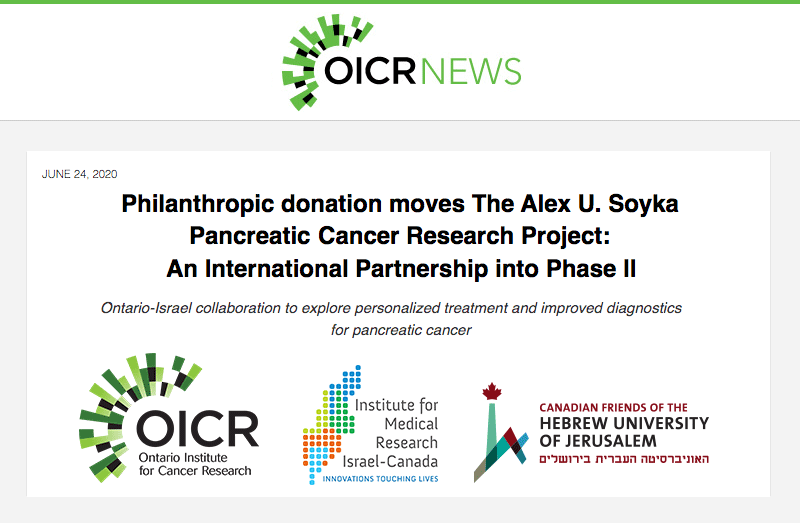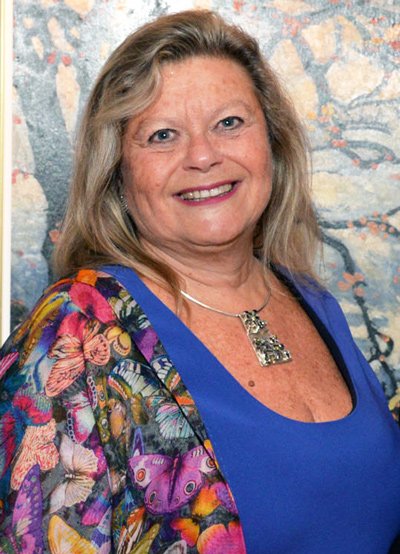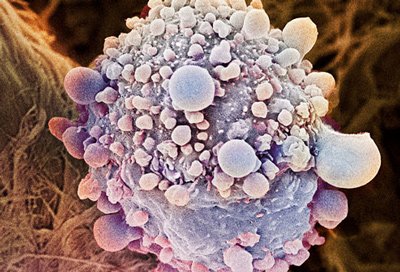


Toronto – (June 24, 2020) A second significant multi-year commitment from Sylvia M. G. Soyka, Director, and the Alex U. Soyka Foundation to the Canadian Friends of the Hebrew University of Jerusalem (CFHU) will allow researchers from the Ontario Institute for Cancer Research (OICR), the Hebrew University’s Institute for Medical Research Israel-Canada (IMRIC) and Sheba Medical Center to conduct The Alex U. Soyka Pancreatic Cancer Research Project: Phase II – An International Partnership (Soyka Project).
Phase II builds upon the outstanding achievements of Phase I of the Soyka Project by fostering further collaboration between Israeli and Ontario researchers, focusing on three main research avenues in pancreatic cancer – to develop effective patient-specific treatment courses, address the challenges of tumour cell heterogeneity and create new methods for early-stage diagnosis.
As a measure of its impact so far, Phase I of the Soyka Project has been cited in more than 18 peer-reviewed papers on pancreatic cancer including manuscripts in the prestigious journals Nature Genetics, Nature Medicine and Cancer Cell. Phase II of the Soyka Project will provide eight of Israel’s leading cancer researchers with funds to explore the molecular origins of pancreatic cancer, as well as novel diagnostic biomarkers and therapeutic approaches. These fellowships are key to the multi-disciplinary approach of the Soyka Project and this round of funding will see new scientists joining the team with expertise in single-cell RNA sequencing and bioinformatics, some of the most advanced approaches used in cancer research today.
 A central component of Phase II is to increase the opportunity for patients at the Sheba Medical Center in Israel to be molecularly profiled according to the COMPASS clinical trial guidelines. COMPASS is a world-leading initiative led by Dr. Steven Gallinger, supported by OICR and based at the University Health Network in Toronto, that uses genomic and transcriptomic information from patient tumours to personalize treatment with the aim of improving outcomes. The data collected through COMPASS will also be used by Soyka Project scientists to dig deep into the inner workings of pancreatic cancer.
A central component of Phase II is to increase the opportunity for patients at the Sheba Medical Center in Israel to be molecularly profiled according to the COMPASS clinical trial guidelines. COMPASS is a world-leading initiative led by Dr. Steven Gallinger, supported by OICR and based at the University Health Network in Toronto, that uses genomic and transcriptomic information from patient tumours to personalize treatment with the aim of improving outcomes. The data collected through COMPASS will also be used by Soyka Project scientists to dig deep into the inner workings of pancreatic cancer.
“I feel proud and privileged to fund Phase II of this international collaboration in pancreatic cancer research,” says Sylvia M. G. Soyka. “In the world of cancer research, much progress has been made in recent years, but pancreatic cancer remains a deadly disease with a dismal less than 10% five-year survival rate. When we started Phase I in 2014, the five-year survival rate was less than 5%, but there is clearly a long way to go. In 2010, my father, a man fully engaged in every aspect of life who took great pains to look after his health, the sort of person who was going to live well forever, was diagnosed out of the blue and died three months to the day later. The Soyka Project is his legacy. Phase I was highly successful, in no small part due to the collaboration of the dedicated scientists, within and between the teams, which created new directions. In the context of today’s world, I feel strongly that the fact of the collaboration alone, which requires both trust and generosity of spirit, sets an important example which should be emulated. The rewards of Phase II will be ours as well as theirs.”

“I am extremely thankful to Sylvia Soyka for her generous funding of this cutting-edge research program. Pancreatic cancer is notoriously difficult to detect and treat and patients need better options,” says Dr. Laszlo Radvanyi, President and Scientific Director, OICR. “The Soyka Project is an incredible example of the benefits of international scientific collaboration that will reveal important insights into detecting pancreatic cancer earlier and developing precision medicine tools for improved treatment. We are thrilled to continue this important work with our partners in Israel.”
“Sylvia Soyka is the driving force and inspiration behind The Alex U. Soyka Pancreatic Cancer Research Project that started six years ago and now, her recent generous donation will allow the second phase of research,” says Prof. Haya Lorberboum-Galski, Chair of IMRIC. “Her longstanding support is of vast importance to the researchers at IMRIC as it will enable us to continue our ongoing endeavour to decipher the basic molecular aspects of one of the deadliest cancers – pancreatic cancer. We hope this exciting work, in collaboration with OICR, will lead to new approaches for early diagnosis, prevention, treatment and a cure.”
“Sylvia Soyka is an exemplary philanthropic leader who decided to tackle one of the most challenging and underfunded cancers,” says Rami Kleinmann, President and CEO of CFHU. “Together with an outstanding team of researchers and practitioners from Canada and Israel, she managed to help make substantial progress in understanding the disease. We hope that with the current funding of Phase II, we will be able to take it even further.”
About The Alex U. Soyka Pancreatic Cancer Research Project: Phase II – An International Partnership (Soyka Project)
Alex U. Soyka was a committed supporter of the Hebrew University through the CFHU in Montreal. Following his death from pancreatic cancer in 2010, his daughter Sylvia M. G. Soyka, Director, and the Alex U. Soyka Foundation, made a multi-year funding commitment to CFHU to launch The Alex U. Soyka Pancreatic Cancer Research Project.
About the Ontario Institute for Cancer Research (OICR)
OICR is a collaborative, not-for-profit research institute funded by the Government of Ontario. We conduct and enable high-impact translational cancer research to accelerate the development of discoveries for patients around the world while maximizing the economic benefit of this research for the people of Ontario. For more information visit https://oicr.on.ca.
About the Institute for Medical Research Israel-Canada (IMRIC)
The Institute conducts basic and translational/precision research in the field of biomedicine with a main focus on cancer research. The Institute scientists work in a multidisciplinary enterprise that is essential for understanding most of the diseases that currently challenge medical science, including cancer, for the benefit of patients all over the world. For more information visit https://medicine.ekmd.huji.ac.il/En/academicUnits/imric/Pages/Default.aspx.
About the Canadian Friends of Hebrew University (CFHU)
CFHU facilitates academic and research partnerships between Canada and Israel, as well as establishes scholarships, supports research and cultivates student and faculty exchanges. Albert Einstein, Martin Buber, Chaim Weizmann and Sigmund Freud were among the university’s founders whose genius inspired a university without limits or borders. CFHU is dedicated to supporting Hebrew University in its efforts to remain one of the most innovative learning institutions in the world.